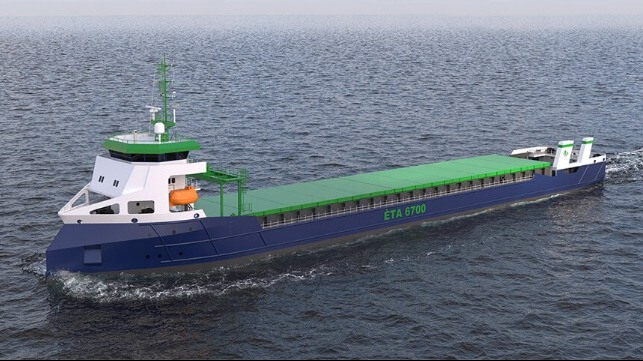Modular Design Enhances Sustainability of Electric Short Sea Cargo Ship

Dutch company ÈTA Shipping is moving forward with its plans to introduce a fleet of sustainable short-sea shipping cargo ships. The company, which was launched in 2019 as a dry cargo shipper, will work with energy and commodity group Mercuria to build and operate an initial fleet of six battery-powered cargo ships.
The new ships, which will be built in China, will be owned by Mare Balticum, a subsidiary of Mercuria, with ÈTA Shipping as a minority shareholder. The maiden voyage of the first vessel is planned for the second quarter of 2025.
Last year working with Western Baltic Engineering, a marine engineering firm in Lithuania, ÈTA profiled its concepts for the design of the ETA 6700, a modular approach to the future of shipping. The vessel will be built with no main engine, instead using electric-powered motors to drive the propellers. Electricity is supplied by generators that initially will be fueled by conventional or low-carbon fuels.
According to the companies, it is a highly efficient design that does not sacrifice the operating speed or cargo carrying capacity. The ship will have a cargo capacity of 7,400 dwt and will achieve speeds of 10.5 knots fully laden while requiring under 900 KW of power. They are saying the vessels will be built at a comparable cost to conventional vessels but will be 30 percent more efficient than a conventional newbuild and 50 percent more efficient than the average ship in the legacy fleet. They are calling the new ships the “most efficient ice 1A vessel in its peer group.”
Anticipating future trends in shipping, the modular design means it will be possible to connect any sustainable power source, such as batteries or fuel-cell technology that can run for example on green hydrogen, methanol, or ammonia. Zero emission solutions can be added or replace the originally installed generators.
“The modular design of the vessels allows for an easy replacement of a power source, which can be anything as long as it produces electricity”, explains co-founder of ÈTA Sam Gombra. “We estimate that it will take less than a day to remove the existing power generation system and replace it, fully or partially, without the need for a shipyard.”
The company reports the initial order is for six vessels that will be built by China’s Taizhou Sanfu Ship Engineering Co. They will also have an option for 10 additional vessels.
Beyond the unique power plant design, the ships will also extensively use automation. This will permit the vessels to operate each with a crew of four instead of the normal six required for operation on a conventional vessel of this design.

that matters most
Get the latest maritime news delivered to your inbox daily.
“The vessel’s 3D management tool that uses over 1,300 sensors, enables virtual navigation, equipment data access, and historical trend analysis for crew and technical staff,” noted Walter van Gruijthuijsen, a naval architect and co-founder of ÈTA Shipping.
Using a future-proof design, efficiency, and automation technologies, ÈTA believes the new class of ships can help to advance the sustainability of short-sea shipping.
